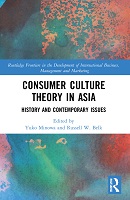Consumer Culture Theory in Asia
Proposal review
History and Contemporary Issues
Abstract
Collaborations between entertainment industries and artificial intelligence researchers in Japan have since the mid-1990s produced a growing interest in modeling affect and emotion for use in mass-produced social robots. Robot producers and marketers reason that such robot companions can provide comfort, healing (iyashi), and intimacy in light of attenuating social bonds and increased socioeconomic stress characteristic of Japanese society since the collapse of the country’s bubble economy in the early 1990s. While many of these robots with so-called “artificial emotional intelligence” are equipped with rudimentary capacities to “read” predefined human emotion through such mechanisms as facial expression recognition, a new category of companion robots are more experimental. These robots do not interpret human emotion through affect-sensing software but rather invite human-robot interaction through affectively pleasing forms of haptic feedback. These new robots are called haptic creatures: robot companions designed to deliver a sense of comforting presence through a combination of animated movements and healing touch. Integrating historical analysis with ethnographic interviews with new users of these robots, and focusing in particular on the cat-like cushion robot Qoobo, this chapter argues that while companion robots are designed in part to understand specific human emotions, haptic creatures are created as experimental devices that can generate new and unexpected pleasures of affective care unique to human-robot relationships. It suggests that this distinction is critical for understanding and evaluating how corporations seek to use human-robot affect as a means to deliver care to consumers while also researching and building new markets for profit maximization.
Keywords
Akshaya, Alison, Amy, and, Asia, Autonomy, B, Bangkok, Belk, Buddhist, Century, Chains, Changing, Chieh, Children's, China, China's, Christina, Cold, Commodity, Community, Cong, Consumer, Consumerism, Consumption, Contemporary, Contents, contributors, Credit, Culture, Death, Devi, Dystopia, Early, Education, Elizabeth, Elsewhere, Empowerment, Eric, Fashion, Food, French, from, Gift, giving, Governance, Guojun, Hackley, Hanoi, He, History, Hsein, Hulme, Humiliation, Hung, I, Identity, II, III, illustrations, in, India, Introduction, Investing, is, Issues, IV, Japan, Jenny, Jia, Juliana, Kazuo, Kinship, Lam, Lee, Li, Lin, List, Liu, Lok, Long, Magnum, Making, Male, Man, March, Mattjis, Memorial, Meng, Michelle, Minowa, Modern, Mother's, National, Neoliberalism, of, on, Pheonix, Ping, Practice, Practices, Precarity, Predicting, Privacy, Projects, Provision, Publishing, Ricks, Rinkinen, Rituals, Rohit, Role, Rungpaka, Russell, Sarah, Sawyer, SECTION, Shove, Smits, Social, Solitary, Study, sun, Sustainability, System, Systems, Thai, Thanatopolitics, The, Theory, Theravāda, Usui, Utopia, Varman, Viayalakshmi, Vijay, W, Wing, Work, Xin, Yang, Yuko, ZhaoDOI
10.4324/9781003111559ISBN
9780367629496, 9780367629502, 9781003111559Publisher
Taylor & FrancisPublisher website
https://taylorandfrancis.com/Publication date and place
2022Imprint
RoutledgeSeries
Routledge Frontiers in the Development of International Business, Management and Marketing,Classification
Business and Management

